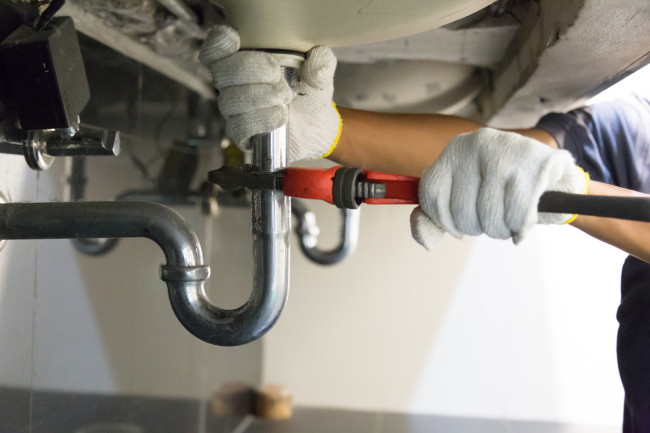5 tips for asserting yourself and getting what you need as a NYC renter
- Choose your words carefully: Ask when your landlord will fix a problem, not if they will
- Use a rent increase at renewal time to get upgrades to your place or better lease terms

Being assertive isn't the same as being aggressive. In fact, you can assert your needs as a renter without harming your relationship with your landlord.
iStock
Plenty of people struggle to be assertive, but negotiating with your landlord can feel like a whole other ballgame.
It may feel uncomfortable to push back on your landlord’s proposed rent increase because you don’t want to sour your relationship. But being assertive—not aggressive—can help you in a variety of ways, like get small repairs done quickly or score more favorable lease terms.
“When people think about assertiveness, they think of assertiveness as being nasty, a sort of slightly ramped down version of aggression,” says Randy Paterson, a psychologist and the author of “The Assertiveness Workbook.”
“It's not at all. It's very calm. It's kind. It's clear. And one of the principles behind this is that positive reinforcement works much better to create behavior change than punishment,” he says.
Take rent increases at lease renewal time, for example. The current competitive market makes it tough to push back against these (although you can still try) since landlords know they can get very high rents if they list the apartment. One trick when you're faced with a rent increase: Ask for something you want, like a longer lease term or upgrades to your apartment like better appliances. Just make sure you know what you want, gather information about your situation ahead of time, and be concise, specific, and polite when discussing your needs.
For problems that are dangerous to your health or safety, you can call 311 to get a city inspector to check out your building. Your landlord is required to provide a home free of pests, lead paint, and other safety hazards—that’s not up to negotiation.
Editor’s Note: Have you successfully negotiated a lower rent increase, renovation, or other deal with your landlord? Send us an email. We may contact you for an article on successful negotiation stories.
1. Know what you want
Before you talk with your landlord, make sure you have a clear idea of what you want to gain from the conversation. For example, if you’re looking to get new appliances, make sure you know when you’d like the swap made and when you’re available to let someone into your apartment to do so.
You could even write down and number the points you want to get across ahead of time to make sure you don’t miss anything, Paterson says. Being prepared will help you remain calm during the conversation, whereas acting frustrated or angry could make your landlord defensive, less likely to help, and hurt your relationship in the future.
“When you're talking with your landlord, it's not about self expression,” Paterson says. “It's not about expressing your feelings, or showing the full nature of your frustration. It's about getting something done.”
“So many people think of communication as a way of expressing what's inside you or what's inside you,” he added. “Well what’s inside you right now is that you want to strangle the landlord. This is not helpful.
2. Have your facts ready
You should gather as much information as possible about your complaint to strengthen your argument. If you want to negotiate a lower rent increase, have a record of your good behavior as a tenant—such as paying rent on time—and an idea of the price of similar apartments in your neighborhood.
If your landlord is dragging their feet on small repairs, keep track of when your problem started, how long it has lasted, and how many times you’ve called or emailed your landlord to get it addressed. And when you talk to your landlord, be specific about the issue and your previous complaints.
“You don't want to say, ‘I think I've been emailing you a million times,’ because you're lying. You have not emailed them a million times,” Paterson says. “You want to be able to say, ‘I emailed four times. How many emails do you think would be reasonable in order to get this handled?’”
3. Be concise and specific
You might want your landlord to be more responsive, more polite, or just less of a jerk. But asking your landlord to change their attitude isn’t going to get you anywhere, Paterson says. Instead, you should ask for a specific, concrete action.
For example, if your landlord is dragging their feet on a maintenance issue, get a time and date for when the problem will be fixed. A specific deadline gives you a legitimate reason to complain if your landlord fails to meet it and puts them under pressure to take action.
And once you’ve made your point, stop talking. Getting distracted or upset can make your discussion less productive, Paterson says.
“When somebody gets angry and they start yelling or something, we often say that they've lost ‘it.’” Paterson says. “What they've lost is control. By getting angry with this other person, they're trying to establish control. But by getting angry and spluttering, they're losing control instead. You have much more control if you remain calm.”
4. Frame the future as a certainty
For repairs and other maintenance issues, don’t ask your landlord when something “could” be done, ask them when it “will” be done, Paterson says.
It’s best to speak in the plain future tense to pressure your landlord to take action. Presuming that the outcome you’re looking for will happen lets the discussion focus on logistics, not whether your landlord is willing to make repairs.
5. Follow up and say thanks
It can be tempting to threaten your landlord to get them to act quickly, but a lighter touch is more effective and can help you maintain a good relationship, Paterson says.
In the case of repairs, promise to call them if the problem is not resolved at the agreed upon time and date, but frame that promise as if you’re doing them a favor. You don’t want to bother them, so instead of calling every day until the problem is fixed, you’re not going to call them until the agreed upon date passes.
“In other words, what you're saying is that I am going to call you [if it isn’t done]. But you're saying it in a kind way that shows you're considerate of them,” Paterson says. “It's tempting for people in these situations to feel powerless and they try to attain their power by threatening. The better thing to do is to follow-up very kindly.”
If your landlord agrees to swap out your appliances for newer models, reduce your rent increase, or another benefit, don’t forget to say thanks. Positive feedback could make them more willing to deal with you in the future, Paterson says.
You Might Also Like


























